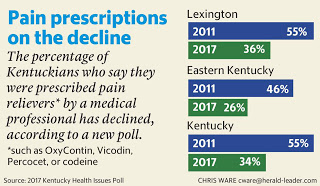Reports show what adults in five Kentucky regions think about substance abuse, smoking and other issues

The 2017 Kentucky Health Issues Poll found that significantly fewer Kentucky adults are getting prescriptions for pain medication; that they strongly support smoke-free schools; and that most would like to see the age to purchase cigarettes raised to the age of 21. But the numbers vary by region.
To show regional attitudes about the issues of substance abuse and smoking, which were the main foci of the 2017 poll, the Foundation for a Healthy Kentucky has released reports on the findings in regions defined as Eastern, Western and Northern Kentucky, Greater Lexington, and Greater Louisville.
The results may help individual communities and the state decide important health policies that affect everyone, whether that be smoke-free workplace laws, smoke-free school policies, substance-abuse treatment and recovery programs, and access to health care.
The Eastern Kentucky report says that while the responses from people in this region were largely comparable to the state results, there were a few key differences. For example, adults in the region (22 percent of the state) were less likely to hold favorable opinions about the Patient Protection and Affordable Care Act, often called Obamacare, than the rest of the state.
That said, fewer people in Eastern Kentucky and the rest of the state are reporting an unfavorable opinion of the ACA — dropping to 36 percent in 2017 from 52 percent in 2016. Statewide results for an unfavorable opinion of the ACA dropped to 33 percent from 46 percent.
Adults in Eastern Kentucky were also less likely to report having “excellent” or “very good” health and to have a household income more than double the federal poverty level. They were more likely to say they believe addiction is not a disease, and to report they they did not get a prescription pain pill in the past five years. That trend was seen statewide.
“We can see that prescribing practices have changed,” Rachelle Seger, community health research officer for the foundation, told Linda Blackford of the Lexington Herald-Leader.
The Western Kentucky report, covering 27 percent of the state’s population, says that in general, poll results were comparable to the state as a whole. For example, the number of Western Kentucky adults being prescribed pain pills dropped from 54 percent in 2011 to 35 percent in 2017, similar to the statewide drop from 55 percent to 34 percent.
Adults in Northern Kentucky were more likely to have unfavorable opinions about the Affordable Care Act; report knowing friends or family members who have had problems with heroin; report higher rates of being uninsured; and to report excellent or very good personal health.
The report notes that the percentage of Northern Kentucky adults without health insurance more than doubled from 2016 to 2017, rising from 11 percent to 26 percent.
The Greater Lexington report, covering 17 counties and 18 percent of the population, found just a few key differences with the rest of the state. Residents of then Bluegrass Region were less likely to hold unfavorable opinions about the Affordable Care Act and more likely to report excellent or very good personal health.
Also of note, the report found that while support for a statewide smoke-free law remains high in the Greater Lexington area, support dropped to 74 percent in 2017 from 82 percent in 2016.
The Greater Louisville report, covering seven counties and 23 percent of the population, also largely found responses similar to the rest of the state to the poll questions, with a few differences. One was 80 percent support for a comprehensive, statewide smoke-free law, the highest level in the state. The statewide support was 71 percent.
They also held a more favorable opinion of the ACA, 52 percent compared to 44 percent statewide and showed a significant drop in unfavorable opinions about the health reform law, to 33 percent in 2017 from 46 percent in 2016.
The poll, taken Oct. 24 -Dec. 2, is sponsored by the foundation and Interact for Health, a Cincinnati-area foundation. It surveyed a random sample of 1,692 Kentucky adults via landlines and cellphones. The margin of error for each statewide result is plus or minus 2.4 percentage points and varied between plus or minus 5.2 percentage points and 5.6 percentage points in the regional report.